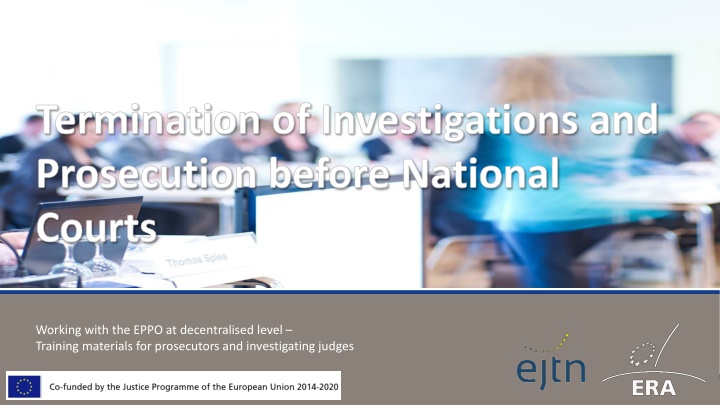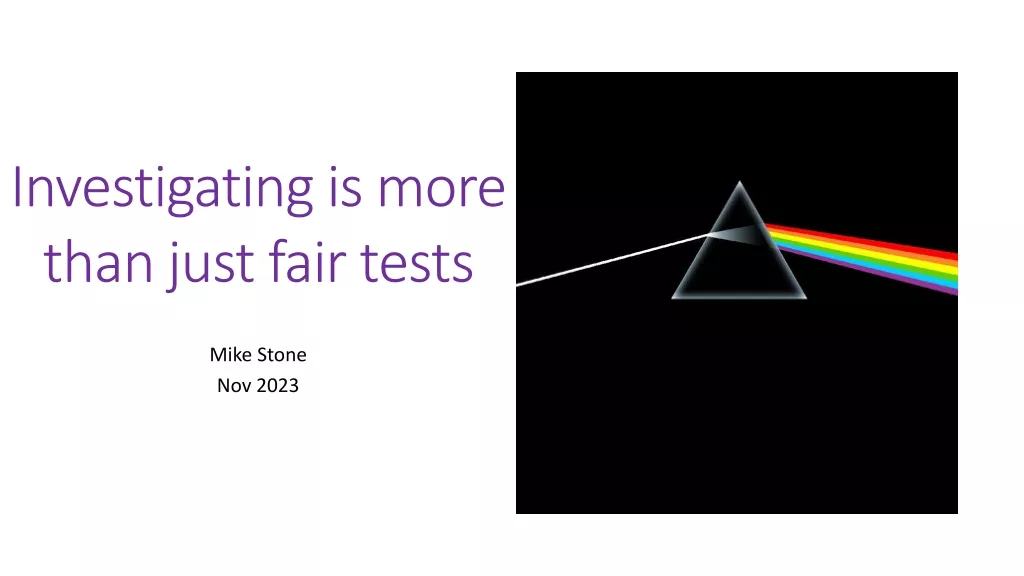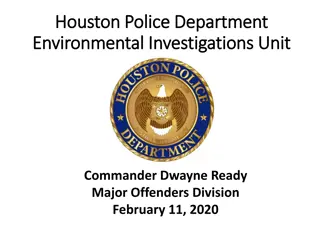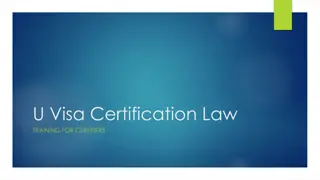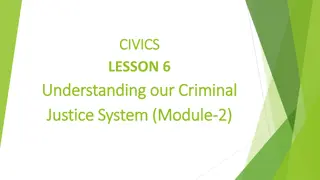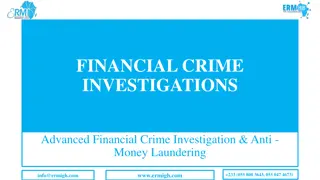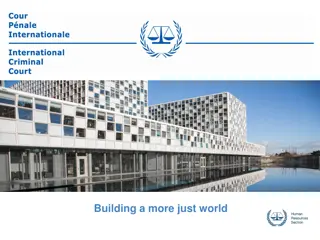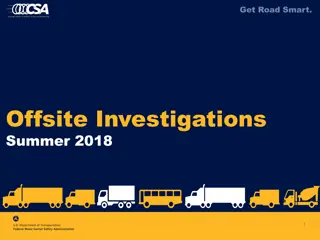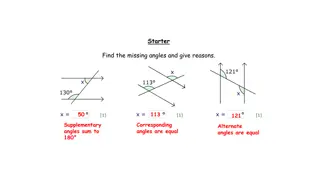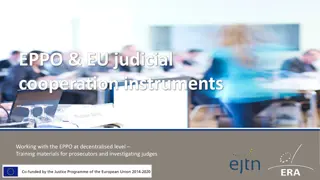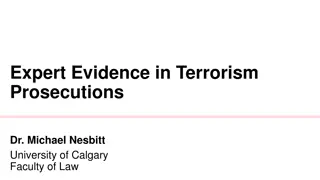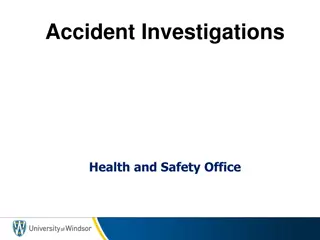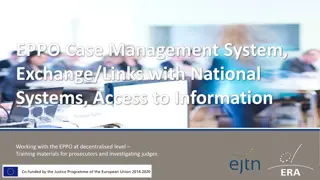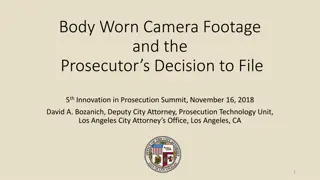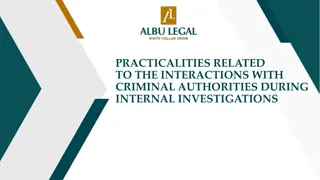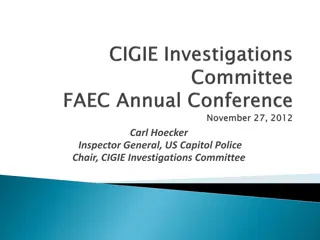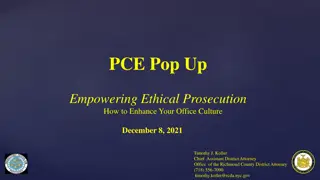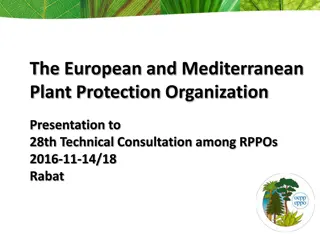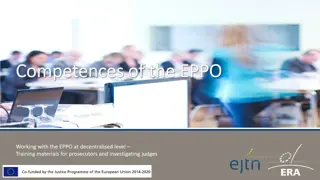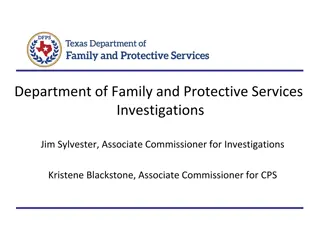Procedures for Concluding EPPO Investigations and Prosecutions
Explore the termination procedures in EPPO investigations before national courts, including bringing cases to judgment, dismissal, simplified prosecution, and referral. Learn about the decision-making processes, prosecution before national courts, and the powers of European Delegated Prosecutors. Includes the choice of forum for prosecution and the possibility of joining cases in a single Member State.
Download Presentation

Please find below an Image/Link to download the presentation.
The content on the website is provided AS IS for your information and personal use only. It may not be sold, licensed, or shared on other websites without obtaining consent from the author.If you encounter any issues during the download, it is possible that the publisher has removed the file from their server.
You are allowed to download the files provided on this website for personal or commercial use, subject to the condition that they are used lawfully. All files are the property of their respective owners.
The content on the website is provided AS IS for your information and personal use only. It may not be sold, licensed, or shared on other websites without obtaining consent from the author.
E N D
Presentation Transcript
Termination of Investigations and Prosecution before National Courts Working with the EPPO at decentralised level Training materials for prosecutors and investigating judges 1
Ways to Conclude the Investigation Regulation 2017/1939 (EPPO Regulation) Article 10(3) EPPO Regulation: (a) to bring a case to judgment in accordance with Article 36(1), (3) and (4); (b) to dismiss a case in accordance with point (a) to (g) of Article 39(1); (c) to apply a simplified prosecution procedure and to instruct the European Delegated Prosecutor to act with a view to finally dispose of the case in accordance with Article 40; (d) to refer a case to the national authorities in accordance with Article 34(1), (2), (3) or (6); Article 35(1): When the handling European Delegated Prosecutor considers the investigation to be completed, he/she shall submit a report to the supervising European Prosecutor, containing a summary of the case and a draft decision whether to prosecute before a national court or to consider a referral of the case, dismissal or simplified prosecution procedure in accordance with Article 34, 39 or 40. . See Article 2 of the IRP Internal Rules of Procedure (Decision 003/2020 of the College) and Decision on Internal Language Arrangements (Decision 002/2020 of the College): Internal working language is English. See also Article 56 of the IRP. 2
Information processes in deciding Information processes in deciding how to conclude investigation how to conclude investigation Chamber ECP EP EE EP AT Note: DE, FR, IT, EE chosen as examples could be different participating Member States EP DE EP FR EP IT EPPO EDP DE EDP IT EDP FR national level Court FR Court IT Court DE 3
Article 36 Prosecution before National Courts Article 36(1) EPPO Regulation: When the European Delegated Prosecutor submits a draft decision proposing to bring a case to judgment, the Permanent Chamber shall, following the procedures set out in Article 35, decide on this draft within 21 days. The Permanent Chamber cannot decide to dismiss the case if a draft decision proposes bringing a case to judgment. Article 13(1) EPPO Regulation : TheEuropean Delegated Prosecutors shall act on behalf of the EPPO in their respective Member States and shall have the same powers as national prosecutors in respect of investigations, prosecutions and bringing cases to judgment, in addition and subject to the specific powers and status conferred on them, and under the conditions set out in this Regulation. Choice of forum for prosecution: principle (Art. 36(3)) is Member State of the handling EDP, deviation (Art. 36(3)): different MS, if sufficiently justified grounds to do so, taking into account the criteria set out in Article 26(4) and (5) Possible joining of cases for prosecution in a single MS (Art. 36(4), recitals 67, 68) Judicial Review (recital 87(2): by national courts, at the latest at the trial stage . On the Chambers, see also Articles 15 to 24 of the IRP. 4
Article 36 Prosecution before National Courts Article 36(1) EPPO Regulation : When the European Delegated Prosecutor submits a draft decision proposing to bring a case to judgment, the Permanent Chamber shall, following the procedures set out in Article 35, decide on this draft within 21 days. The Permanent Chamber cannot decide to dismiss the case if a draft decision proposes bringing a case to judgment. Article 36(4) EPPO Regulation : Before deciding to bring a case to judgment, the competent Permanent Chamber may, on the proposal of the handling European Delegated Prosecutor, decide to join several cases, where investigations have been conducted by different European Delegated Prosecutors against the same person(s) with a view to prosecuting these cases in the courts of a single Member State which, in accordance with its law, has jurisdiction for each of those cases. Possible joining of cases for prosecution in a single MS (Art. 36(4), recitals 67, 68) See also Articles 49 to 51 of the IRP on the reallocation/merging/splitting of cases. 5
Article 36 Prosecution before National Courts Article 36(1) EPPO Regulation: When the European Delegated Prosecutor submits a draft decision proposing to bring a case to judgment, the Permanent Chamber shall, following the procedures set out in Article 35, decide on this draft within 21 days. The Permanent Chamber cannot decide to dismiss the case if a draft decision proposes bringing a case to judgment. What types of prosecutorial decisions available pursuant to the national law of the handling EDP would fall under a decision proposing to bring a case to judgment ? Indictments only? Or other equivalent alternatives under national law? And which would these be? What is the difference to Article 40 (simplified prosecution procedures)? What is the threshold under national law that has to be met by the prosecutor before he/she can bring the case before a court for trial? 6
Article 36 Prosecution before National Courts Article 36(6) EPPO Regulation: Where necessary for the purposes of recovery, administrative follow-up or monitoring, the Central Office shall notify the competent national authorities, interested persons and the relevant institutions, bodies, offices and agencies of the Union of the decision to prosecute. Information obligations For specific purposes: recovery, administrative follow-up or monitoring To whom? competent national authorities: administrative authorities?, other authorities? interested persons: participants to criminal proceedings?, other persons? relevant institutions, bodies, offices and agencies of the Union: Commission?, OLAF, others? Channels of communication? (why the Central Office ?, and not the EDP who is handling the case?) 7
Article 39 Dismissal of a Case Article 39(1) EPPO Regulation: Where prosecution has become impossible, pursuant to the law of the Member State of the handling European Delegated Prosecutor, the Permanent Chamber shall, based on a report provided by the European Delegated Prosecutor handling the case in accordance with Article 35(1), decide to dismiss the case against a person on account of any of the following grounds: (a) the death of the suspect or accused person or winding up of a suspect or accused legal person; (b) the insanity of the suspect or accused person; (c) amnesty granted to the suspect or accused person; (d) immunity granted to the suspect or accused person, unless it has been lifted; (e) expiry of the national statutory limitation to prosecute; (f) the suspect s or accused person s case has already been finally disposed of in relation to the same acts; (g) the lack of relevant evidence. Recital 81: The grounds for dismissal of a case are exhaustively laid down in this Regulation. 8
Article 39 Dismissal of a Case Article 39(1) EPPO Regulation: pursuant to the law of the Member State of the handling European Delegated Prosecutor, decide to dismiss the case against a person on account of any of the following grounds: (a) ... (g) Recital 81: The grounds for dismissal of a case are exhaustively laid down in this Regulation. pursuant to the law of the Member State: applicable implementing rules under national criminal procedure of Member State of handling EDP / your Member State? 9
Article 39 Dismissal of a Case Article 39(2) EPPO Regulation: A decision in accordance with paragraph 1 shall not bar further investigations on the basis of new facts which were not known to the EPPO at the time of the decision and which become known after the decision. The decision to reopen investigations on the basis of such new facts shall be taken by the competent Permanent Chamber. Consequence of dismissal: in principle, bar to further investigations Article 39(3): Where the EPPO is competent in accordance with Article 22(3), it shall dismiss a case only after consultation with the national authorities of the Member State referred to in Article 25(6). Consultation obligations: Offering case to national judiciary See Article 58 of the IRP. 10
Article 40 Simplified Prosecution Procedures Article 40(1) EPPO Regulation: If the applicable national law provides for a simplified prosecution procedure aiming at the final disposal of a case on the basis of terms agreed with the suspect, the handling European Delegated Prosecutor may, in accordance with Article 10(3) and Article 35(1), propose to the competent Permanent Chamber to apply that procedure in accordance with the conditions provided for in national law. applicable national law provides for a simplified prosecution procedure aiming at the final disposal on the basis / upon fulfilment of the terms agreed with the suspect conditions provided for in national law Do such simplified prosecution procedures exist under national law? What are the details and modalities of these simplified prosecution procedures? What distinguishes them from measures to bring a case to judgement under Art. 36? 11
Article 40 Simplified Prosecution Procedures Article 40(2) EPPO Regulation: The Permanent Chamber shall decide on the proposal of the handling European Delegated Prosecutor taking into account the following grounds: (a) the seriousness of the offence, based on in particular the damage caused; (b) the willingness of the suspected offender to repair the damage caused by the illegal conduct; (c) the use of the procedure would be in accordance with the general objectives and basic principles of the EPPO as set out in this Regulation. College shall adopt guidelines on the application of those grounds Criteria: Do they all have to be met cumulatively, or are they alternatives? 12
Article 40 Simplified Prosecution Procedures Article 40(1) EPPO Regulation: Where the EPPO exercises a competence in respect of offences referred to in points (a) and (b) of Article 3(2) of Directive (EU) 2017/1371 and where the damage caused or likely to be caused to the Union s financial interest does not exceed the damage caused or likely to be caused to another victim, the handling European Delegated Prosecutor shall consult national prosecution authorities before proposing to apply a simplified prosecution procedure Consultation obligations: Offering case to national judiciary See Articles 61 and 62 the IRP. Article 40(3) EPPO Regulation: If the Permanent Chamber agrees with the proposal, the handling European Delegated Prosecutor shall apply the simplified prosecution procedure in accordance with the conditions provided for in national law and register it in the case management system. When the simplified prosecution procedure has been finalised upon fulfilment of the terms agreed with the suspect, the Permanent Chamber shall instruct the European Delegated Prosecutor to act with a view to finally dispose of the case. Application according to national law 13
Article 34 Referrals and Transfers to National Authorities The EPPO shall refer the case to national authorities, if no criminal offence in accordance with Articles 22 and 23 conditions for exercise of EPPO competence (Articles 25(2) and (3) EPPO Regulation are not met EPPO considers a dismissal of a case where the EPPO exercised an ancillary competence in accordance with Article 22(3) EPPO Regulation or where the Union s damage does not exceed damage caused to another victim The College may issue guidelines, allowing the Permanent Chamber to transfer a case to the national authorities if the damage to the EU is less than 100 000 and where in accordance with the guidelines set by the College the seriousness of the offence or the complexity of the case does not require an investigation at EU level Procedures in case of offences outside EPPO competence Article 34(5) EPPO Regulation: if national authority does not accept to take over the case (within 30 days), the EPPO remains competent (except where in accordance with Article 22 and 23 the EPPO has no competence). Article 34(7), (8) EPPO Regulation: transfer of file to nat l authority, no further EPPO investigative or prosecutorial measures, close the case, notification/info to nat l authorities, relevant Union institutions etc. (OLAF), suspects or accused persons, crime victims See also Article 57 of the IRP. 14
Article 35 Termination of the investigation Article 35(1) EPPO Regulation: When the handling EDP considers the investigation to be completed, he/she shall submit a report to the supervising European Prosecutor with summary of the case and a draft decision EP forwards documents to the Permanent Chamber, if necessary, with his/her own assessment when Permanent Chamber takes decision as proposed by the EDP, he/she shall pursue the matter accordingly No requirement that Permanent Chamber reviews case file but Art. 10(6): All case material shall be accessible upon request to the competent Permanent Chamber for the purpose of preparing decisions. Article 35(2): If Permanent Chamber does not take decision as proposed by the EDP Chamber undertakes its own review of the case file, where necessary, then takes a final decision (where possible without further steps by EDP) or gives further instructions to the EDP e.g. additional investigations with a view to bring case before a court instead of dismissal, or changing conditions to be met by accused under Art. 40 simplified prosecution procedure 15
Decision processes when terminating Decision processes when terminating the investigation the investigation Chamber ECP EP EE EP AT Note: DE, FR, IT, EE chosen as examples could be different participating Member States EDP Report, and if considered necessary EP s own assessment Chamber Decision (Art. 10(3)) Proposal to prosecute and no Chamber decision within 21 days EP DE Not as proposed by EDP (Art. 35(2)) As proposed by EDP (Art. 35(1)) Chamber reviews case file (Art. 35(2)) Report (with summary of the case and a draft decision) EDP DE: pursues matter, notification/info to nat l authorities, relevant Union institutions etc. (OLAF), suspects or accused persons, crime victims investigation complete (Art. 35(1)) EDP DE 16
Decisions to be taken under national law Article 5(3) EPPO Regulation: The investigations and prosecutions on behalf of the EPPO shall be governed by this Regulation. National law shall apply to the extent that a matter is not regulated by this Regulation. Unless otherwise specified in this Regulation, the applicable national law shall be the law of the Member State whose European Delegated Prosecutor is handling the case in accordance with Article 13(1). Where a matter is governed by both national law and this Regulation, the latter shall prevail. Article 13(1) EPPO Regulation: TheEuropean Delegated Prosecutors shall act on behalf of the EPPO in their respective Member States and shall have the same powers as national prosecutors in respect of investigations, prosecutions and bringing cases to judgment, in addition and subject to the specific powers and status conferred on them, and under the conditions The European Delegated Prosecutors shall be responsible for those investigations and prosecutions that they have initiated, that have been allocated to them or that they have taken over using their right of evocation. set out in this Regulation. The European Delegated Prosecutors shall also be responsible for bringing a case to judgment, in particular have the power to present trial pleas, participate in taking evidence and exercise the available remedies in accordance with national law. 17
Court Proceedings / Trial Phase Article 86 TFEU: (2) [EPPO] shall exercise the functions of prosecutor in the competent courts of the Member States (3) The regulations referred to in paragraph 1 shall determine the general rules applicable to [EPPO], the conditions governing the performance of its functions, the rules of procedure applicable to its activities, as well as those governing the admissibility of evidence, and the rules applicable to the judicial review of procedural measures taken by it in the performance of its functions. Article 5(3) EPPO Regulation: National law shall apply to the extent that a matter is not regulated by this Regulation. Unless otherwise specified in this Regulation, the applicable national law shall be the law of the Member State whose European Delegated Prosecutor is handling the case in accordance with Article 13(1). Where a matter is governed by both national law and this Regulation, the latter shall prevail. Article 13(1) EPPO Regulation: The European Delegated Prosecutors shall also be responsible for bringing a case to judgment, in particular have the power to present trial pleas, participate in taking evidence and exercise the available remedies in accordance with national law. Court proceedings / trial phase governed by national law see also EPPO Regulation: Art. 36(5) (competence of national court), Art. 37(2) (assessment of evidence), Art. 40(1) (procedure in accordance with the Art. 42(1) (judicial review by national court), Art. 45(2) (case file) conditions provided for in national law), 18
Thank you for your attention WWW.EUROPEAN.LAW
